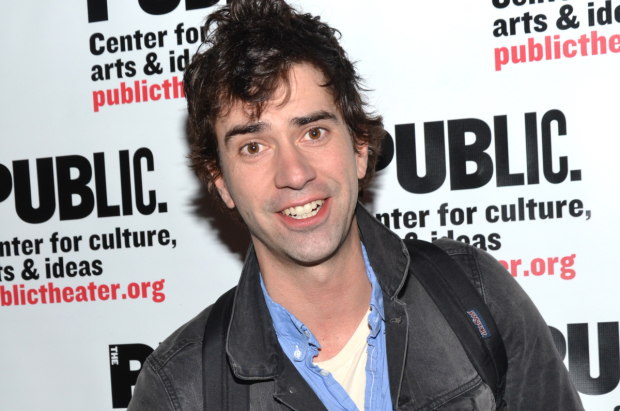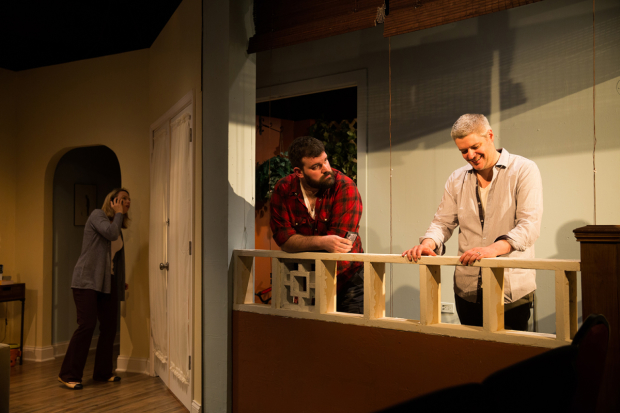As a Playwright, Hamish Linklater Lends His Actorly Insights to The Cheats
Hamish Linklater describes the experience of sitting through a production of one of his own plays as a "wonderful, spiritual, gastroenterological exercise." Though he's best known as an actor (Shakespeare in the Park, Broadway's Seminar), it's obvious Linklater also has a singular way with words.
The play in question is Linklater's second, The Cheats, now running at Chicago's Steep Theatre under the direction of Joanie Schultz. The Cheats follows on the heels of Linklater's first play, The Vandal, which premiered in 2013 at New York City's Flea Theater. Both plays put Linklater's unique spin on topics that are universally recognizable. In the case of The Vandal, that topic is death, while The Cheats toys with the ideas of fidelity and "accidentally" spying on your neighbors — which is exactly what Linklater was doing when the idea for the play came to him…though he took some artistic license.
"The couple across the street were not going through at all what my feverish imagination had put in their path," says Linklater. But fortunately for the audience and ensemble of The Cheats, the incident inspired Linklater to use his imagination and his actor instincts to create a play that includes big emotions, laugh lines, and some "yummy language."

(© David Gordon)
What made you turn to playwriting?
Not to sound too mystical wizardy about it, but I think the plays that I've written have been a bit compulsory. I guess I just find that I have something I want to write, and usually when I sit down to write it, I don't know what it is. But I'll have a couple of characters who are jaunty and charming and they keep me going from page one to page two.
What inspired this particular play?
It actually started because there's an incident described in the play of spying on the neighbors and that sort of happened to me. I was sitting out on my balcony and saw this odd moment between the neighbors and I went inside and started thinking about it back and forth and then started writing the back and forth about what could have happened, and I thought, "It's probably better if there's a couple who's having the back and forth instead of me just talking to myself."
I didn't really have a plan but it was sort of like, you start with a little bit of a taboo and then taboos tend to open things up for you.
Is it exciting or scary for you to write without knowing where your play is going?
It's exciting for me when a play is happening. I try to stay dumb during the process for as long as possible because if I figure out what the last scene would be fun to be too early, then I don't really want to write the interim parts that get there. That becomes a sort of chore.
You want it to be process as much as possible. If it becomes product prematurely, at least for me, then I don't get the work done.
How does being an actor influence your work as a playwright?
I know what I like to do as an actor and I know what I love to see my fellow actors do, and that's have big emotions to play and have the gratification of a few good laugh lines and a lot of hopefully yummy language to run with. So that's kind of the goal.
I know fun things to do, you know, you kind of want to write a play where someone can scale a balcony or have a sword fight or something like that. That's the ideal.
Why do you think fidelity is a topic that we're so interested in?
I think a lot of people get involved in marriage, so there's a certain common currency, and you know… Hopefully people find it a fresh and terrifying perspective. I have zero interest in punishing an audience, so [my] plays are short, funny, tail-twisty. They hopefully keep the audience guessing. Really, I'm all about the entertainment at the end of the day.
Have you been able to be a big part of the process at Steep?
I really have. I was there for the first week where we were sort of around the table and it was more of a workshop, and I got to hear the play and make cuts and make changes. The play sort of binged and then purged [laughs] — you know, went from 83 to 88 pages, and hopefully its back down to somewhere around 84 or 85. Then I got to come back for the last few days of tech and see a few run-throughs and the first preview, which was awesome. They had this big group of visually impaired audience members who they bus in and they really are very vocal, so it's great for the cast to sort of hear where the laughs and the groans in the play are gonna be.
What is it like being produced in Chicago?
Chicago theater has always been kind of a dream for me. The ensembles [in this city] are so tight-knit, they know each other so well. There's such a short hand that, when it comes time for them to scream at each other, it's not the first time, which is useful when you're playing a married couple.

(© Gregg Gilman)











